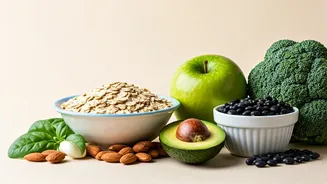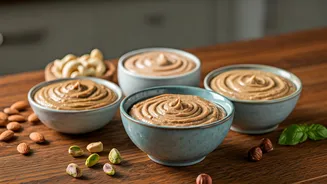Oats: Start Your Day
Oats, a staple breakfast choice, contain soluble fiber, which is highly effective in lowering LDL cholesterol, often called "bad" cholesterol. Soluble
fiber binds to cholesterol in the digestive system, preventing its absorption into the bloodstream. Just a daily serving of oats can lead to significant reductions in LDL levels. You can effortlessly include oats in your diet through various preparations, such as oatmeal, overnight oats, or adding them to smoothies and baked goods. They're easy to prepare and can be customized with fruits, nuts, and seeds to create a wholesome meal that supports heart health. Making oats a part of your breakfast can be a delicious step towards a healthier lifestyle.
Beans and Lentils: Powerhouses
Beans and lentils are packed with soluble fiber, similar to oats, which aids in reducing LDL cholesterol. These legumes are also rich in protein and fiber, promoting a feeling of fullness that can help manage weight, another key factor in maintaining healthy cholesterol levels. Incorporating beans and lentils into your meals is simple and versatile. They can be added to soups, stews, salads, or used as a base for vegetarian dishes. Whether it is a hearty lentil soup or a flavorful bean salad, these options offer both taste and health benefits. Regular consumption of beans and lentils can make a significant impact on heart health and cholesterol management.
Avocado: Creamy Hero
Avocados are rich in monounsaturated fats, which are beneficial for heart health. They can help lower LDL cholesterol while increasing HDL cholesterol, often referred to as "good" cholesterol. They also offer a good source of fiber, contributing to overall heart health. Avocados can be enjoyed in various ways, such as in salads, sandwiches, or as a dip like guacamole. Their creamy texture and mild flavor make them a versatile addition to any meal. Including avocados in your diet helps improve your cholesterol profile and provides essential nutrients, supporting a healthy heart.
Flaxseeds: Tiny, Big Impact
Flaxseeds are packed with omega-3 fatty acids and soluble fiber, which work together to reduce cholesterol levels. Omega-3s help lower triglycerides, a type of fat in the blood that can contribute to heart disease, while fiber helps bind to cholesterol. Consuming flaxseeds is easy: add ground flaxseeds to your smoothies, yogurt, or cereal. You can also sprinkle them on salads or add them to baked goods. Flaxseeds contribute to lower cholesterol, and they also offer other health benefits, such as improving digestion and reducing inflammation. They are a simple and effective addition to your daily diet.
Garlic: The Heart's Friend
Garlic has been shown to reduce LDL cholesterol and can help lower blood pressure. It contains allicin, a compound with potent antioxidant and anti-inflammatory properties, which supports heart health. Adding garlic to your diet is easy; use it to season your dishes, add it to sauces, or consume it in supplement form. Fresh garlic offers a distinct flavor and numerous health benefits. Incorporating garlic into your meals is an easy and delicious way to support your heart health and manage cholesterol levels naturally. Garlic provides a flavorful way to promote heart health.
Green Tea: Sip the Good
Green tea contains catechins, antioxidants that can help lower LDL cholesterol and improve overall cardiovascular health. Regular consumption of green tea has been linked to various health benefits, including reduced risk of heart disease. Drinking green tea is simple. Prepare a cup by steeping green tea leaves or using tea bags. Enjoy it hot or cold, as a refreshing beverage throughout the day. The antioxidants in green tea offer a simple way to improve your heart health. Making green tea a regular part of your routine supports your heart.
Amla: Detox the Body
Amla, also known as Indian gooseberry, is rich in antioxidants and vitamin C, which help reduce LDL cholesterol. Amla supports overall cardiovascular health. It can be consumed in various forms, such as fresh fruit, juice, powder, or supplements. Consuming amla is a traditional practice in India, known for its health benefits. Adding amla to your diet is a simple and effective way to manage cholesterol naturally. The antioxidants and other nutrients in amla contribute to a healthy heart. Enjoy amla as part of a balanced diet.




















